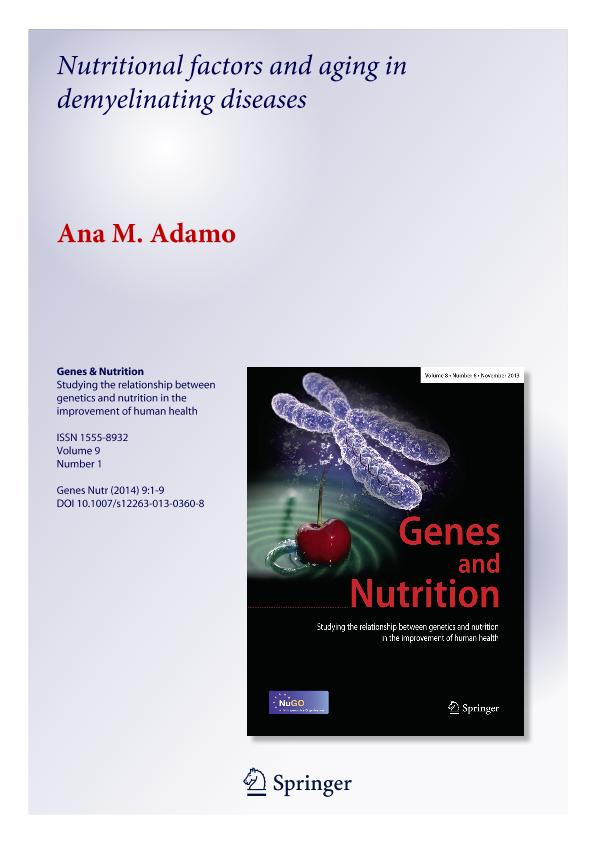Mostrar el registro sencillo del ítem
dc.contributor.author
Adamo, Ana María

dc.date.available
2017-06-09T17:45:10Z
dc.date.issued
2014-01
dc.identifier.citation
Adamo, Ana María; Nutritional factors and aging in demyelinating diseases; Springer Verlag Berlín; Genes and Nutrition; 9; 360; 1-2014; 1-9
dc.identifier.issn
1555-8932
dc.identifier.uri
http://hdl.handle.net/11336/17887
dc.description.abstract
Demyelination is a pathological process characterized by the loss of myelin around axons. In the central nervous system, oligodendroglial damage and demyelination are common pathological features characterizing white matter and neurodegenerative disorders. Remyelination is a regenerative process by which myelin sheaths are restored to demyelinated axons, resolving functional deficits. This process is often deficient in demyelinating diseases such as multiple sclerosis (MS), and the reasons for the failure of repair mechanisms remain unclear. The characterization of these mechanisms and the factors involved in the proliferation, recruitment, and differentiation of oligodendroglial progenitor cells is key in designing strategies to improve remyelination in demyelinating disorders. First, a very dynamic combination of different molecules such as growth factors, cytokines, chemokines, and different signaling pathways is tightly regulated during the remyelination process. Second, factors unrelated to this pathology, i.e., age and genetic background, may impact disease progression either positively or negatively, and in particular, age-related remyelination failure has been proven to involve oligodendroglial cells aging and their intrinsic capacities among other factors. Third, nutrients may either help or hinder disease progression. Experimental evidence supports the anti-inflammatory role of omega-6 and omega-3 polyunsaturated fatty acids through the competitive inhibition of arachidonic acid, whose metabolites participate in inflammation, and the reduction in T cell proliferation. In turn, vitamin D intake and synthesis have been associated with lower MS incidence levels, while vitamin D–gene interactions might be involved in the pathogenesis of MS. Finally, dietary polyphenols have been reported to mitigate demyelination by modulating the immune response.
dc.format
application/pdf
dc.language.iso
eng
dc.publisher
Springer Verlag Berlín

dc.rights
info:eu-repo/semantics/openAccess
dc.rights.uri
https://creativecommons.org/licenses/by-nc-sa/2.5/ar/
dc.subject
Demyelination
dc.subject
Remyelination
dc.subject
Nutritional Factors
dc.subject.classification
Bioquímica y Biología Molecular

dc.subject.classification
Ciencias Biológicas

dc.subject.classification
CIENCIAS NATURALES Y EXACTAS

dc.title
Nutritional factors and aging in demyelinating diseases
dc.type
info:eu-repo/semantics/article
dc.type
info:ar-repo/semantics/artículo
dc.type
info:eu-repo/semantics/publishedVersion
dc.date.updated
2017-06-09T15:00:47Z
dc.identifier.eissn
1865-3499
dc.journal.volume
9
dc.journal.number
360
dc.journal.pagination
1-9
dc.journal.pais
Alemania

dc.journal.ciudad
Berlín
dc.description.fil
Fil: Adamo, Ana María. Universidad de Buenos Aires. Facultad de Farmacia y Bioquímica. Departamento de Química Biológica; Argentina. Consejo Nacional de Investigaciones Científicas y Técnicas. Oficina de Coordinación Administrativa Houssay. Instituto de Química y Físico-Química Biológicas "Prof. Alejandro C. Paladini". Universidad de Buenos Aires. Facultad de Farmacia y Bioquímica. Instituto de Química y Físico-Química Biológicas; Argentina
dc.journal.title
Genes and Nutrition

dc.relation.alternativeid
info:eu-repo/semantics/altIdentifier/url/https://link.springer.com/article/10.1007%2Fs12263-013-0360-8
dc.relation.alternativeid
info:eu-repo/semantics/altIdentifier/doi/http://dx.doi.org/10.1007/s12263-013-0360-8
Archivos asociados
